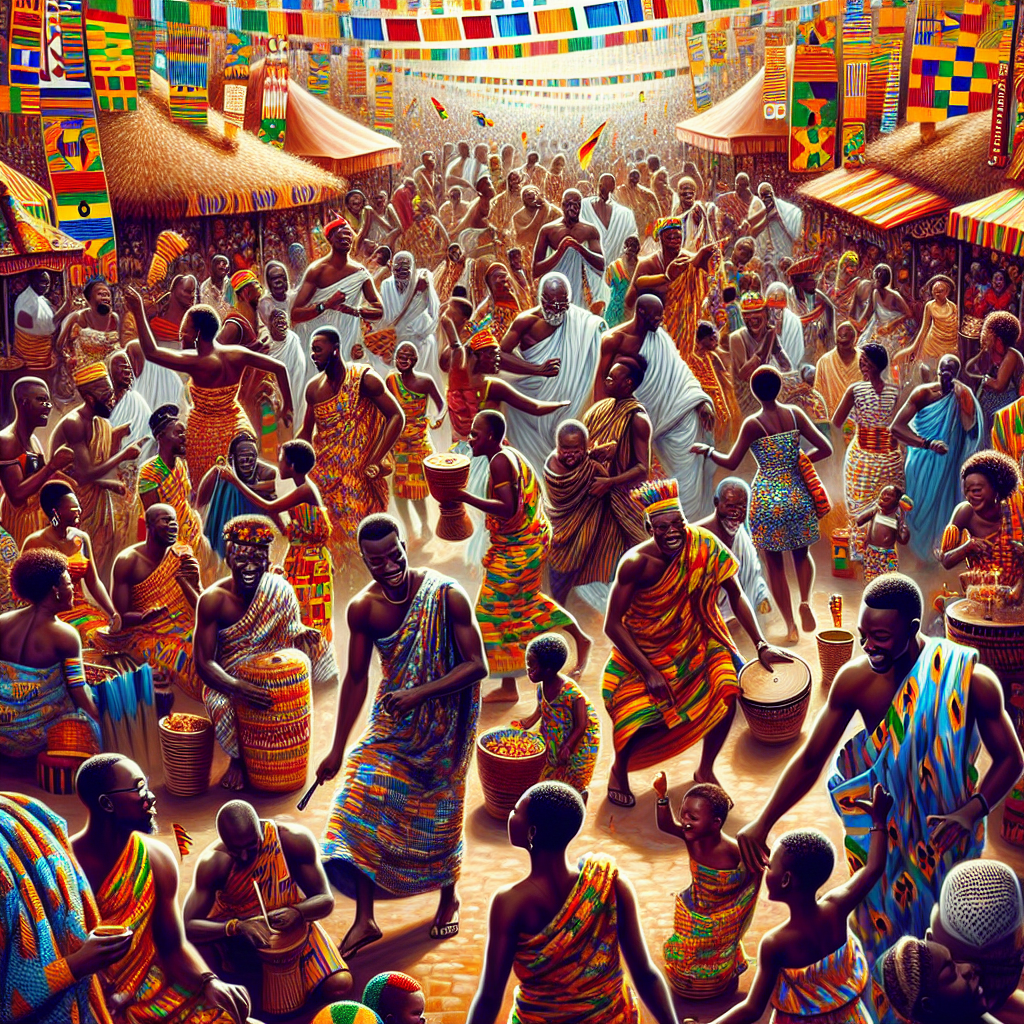Ashanti is a term that resonates through the tapestry of West African history and culture, particularly in Ghana. The Ashanti people, originally known for their rich traditions, vibrant crafts, and significant historical impact, have shaped the African landscape for centuries. This article aims to delve into the fascinating world of the Ashanti, exploring their origins, customs, and the enduring influence they wield in today’s global society.### The Origins of AshantiThe Ashanti Empire, founded in the late 17th century, emerged from the unification of various Akan tribes in what is now modern-day Ghana. The empire reached its peak in the 18th and 19th centuries, becoming a significant political and economical power in West Africa. The founding of the Ashanti Empire was not merely an act of territorial expansion but also a cultural amalgamation. The strength and unity of the Ashanti people are often attributed to their rich traditions, which include a complex social structure, governance, and unique customs that emphasize community over individualism. In essence, the Ashanti developed a sophisticated system of governance led by a king known as the Asantehene. This leader governed through a council comprising the heads of various clans and tribes, ensuring that each voice was heard, promoting fairness and protecting the rights of individuals within the community. The political acumen of the Ashanti kings, coupled with strategic alliances, further fortified their influence in the region.### Ashanti Culture and TraditionsOne of the most striking aspects of the Ashanti people is their rich cultural heritage. From their elaborate festivals to their traditional attire, the Ashanti culture is a celebration of art and creativity. The kente cloth, a symbol of identity and status within the Ashanti culture, represents the history and values of the people themselves. Each pattern and color in kente cloth tells a story, highlighting important events, proverbs, and moral lessons.Festivals such as Akwasidae and Odwira are central to Ashanti life, bringing communities together to celebrate their heritage and pay homage to their ancestors. These festivals serve not only as a means of preserving tradition but also as an opportunity to pass down stories and values from one generation to another.### The Global Impact of AshantiIn contemporary times, the influence of the Ashanti transcends borders. The diaspora has spread Ashanti culture to various parts of the world, enriching diverse societies with their traditions and customs. This global presence is evident in music, fashion, and art forms, making the Ashanti a significant player in cultural exchanges.Despite the challenges faced by the Ashanti community due to modernization and globalization, efforts are in place to preserve their cultural identity. Initiatives aimed at educating younger generations about their heritage are essential in maintaining the vibrancy of Ashanti culture amidst the rapid changes in the world.In conclusion, the term ashanti encompasses much more than just a cultural label; it represents a living legacy of resilience, strength, and creativity. As we continue to explore and celebrate their rich heritage, it becomes our responsibility to ensure that the stories of the Ashanti are cherished and shared across generations. ## Part Two: The Ashanti Empire’s Historical SignificanceAs we journey deeper into the historical significance of the Ashanti Empire, it is crucial to understand the events that shaped not only the Ashanti people but also the wider West African region. The empire’s impact on trade, politics, and cultural exchanges affirms its place in history as a formidable power.### Trade and EconomyThe Ashanti Empire thrived on a robust trade network that connected them with neighboring regions and distant lands. Gold, which the Ashanti referred to as ‘golden dust’, was a primary commodity that attracted European traders. The region’s abundance in natural resources positioned the Ashanti as key players in the lucrative transatlantic trade.However, the effects of colonialism radically altered the landscape of trade within the Ashanti Empire. The British colonial administration imposed direct control over Ashanti territories in the early 20th century, leading to resistance and uprisings. Notably, the War of the Golden Stool in 1900 showcased the Ashanti people’s unwavering spirit and their commitment to preserving their sovereignty and cultural identity against colonial forces.### Political Structure and LeadershipThe political organization of the Ashanti Empire remains an exemplary model of governance. The realm was divided into various regions each governed by chiefs who were responsible for administering local justice and maintaining order. The Asantehene, revered as a semi-divine figure, played a crucial role in unifying the empire and commanding respect from both leaders and commoners alike.The political diplomacy exhibited by the Ashanti kings allowed for various alliances, a testament to their ability to navigate complex interpersonal relationships. These diplomatic efforts were not merely for territorial gains but aimed at fostering stability and prosperity within the empire. Furthermore, traditional practices such as Ghanaian chieftaincy systems continue to influence local governance. The Ashanti political structure serves as a foundation for contemporary governance discussions in Ghana, emphasizing community participation and local empowerment.### Cultural Exchange and InfluenceThe Ashanti Empire’s prominence on the global stage can also be attributed to cultural exchanges. As traders and craftsmen, the Ashanti people traveled extensively, bringing their art, music, and spirituality to various cultures. The introduction of Ashanti traditions into mainstream markets, such as their woodworking, pottery, and beading techniques, has cultivated appreciation for African art across the globe.In modern times, the resurgence of interest in African culture, particularly through fashion and art, has spotlighted Ashanti influence. Collaborations with international artists and designers highlight the fusion of traditional and contemporary aesthetics, providing both economic and cultural capital for the Ashanti community.### Preserving Ashanti Heritage in the Modern WorldAs we progress into the 21st century, the Ashanti people face the challenge of balancing modernization with traditional practices. The push for cultural preservation is critical in ensuring that future generations remain connected to their roots.Educational initiatives focusing on the Ashanti history and culture, both within Ghana and globally, are essential. By fostering appreciation and understanding of the Ashanti legacy, we can ensure that their rich story continues to inspire and educate.Moreover, the acknowledgment of Ashanti contributions in various fields, including literature, music, and arts, encourages pride among the youth, inspiring them to take an active role in preserving their heritage.In summary, the Ashanti Empire represents a remarkable chapter in African history characterized by resilience, diplomacy, and cultural richness. The influences of the Ashanti people have permeated various aspects of life, shaping not only Ghana’s identity but also contributing significantly to the global cultural landscape.## Conclusion: Embracing the Legacy of AshantiIn this exploration of Ashanti culture and history, we uncover a narrative woven into the very fabric of West Africa. The people’s legacy is one that exemplifies the power of community, identity, and cultural pride. As we reflect on the journey of the Ashanti—from a powerful empire to a community navigating the complexities of the modern world—it is vital to recognize the significance of preserving their story.Embracing the Ashanti legacy means acknowledging their contributions to global culture, supporting initiatives that promote their heritage, and fostering an understanding and appreciation for their history. As we celebrate the Ashanti, we also honor the resilience and creativity that define not only a people but an enduring legacy that will echo through the ages. By engaging with the rich tapestry of Ashanti culture, we enhance our collective understanding of humanity, reminding ourselves that our roots shape our identities, and in doing so, we pave the way for a more inclusive and culturally enriched future.









